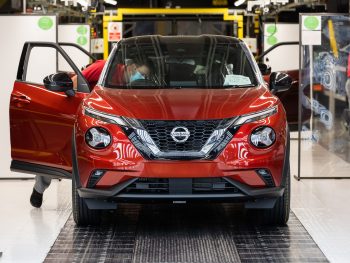UK car output up 34% but energy costs crippling further recovery
UK car production rose 34.0% in August but volumes remain down on pre-pandemic levels and record energy costs threaten further recovery.

UK car production rose 34.0% in August to 49,901 units, but volumes are still 45.9% down on pre-pandemic levels
A total of 49,901 cars rolled off UK lines last month, according to new figures from the Society of Motor Manufacturers and Traders (SMMT).
While it’s up from the 27,346 units in August 2021, the SMMT noted that last summer’s performance marked an historic low due to production stoppages and extended summer shutdowns caused by the global chip shortage.
Moreover, last month’s output was still 45.9% below August 2019’s pre-pandemic level of 92,158 units, underlining the scale of recovery still needed.
And despite four months of growth, year-to-date production remains 13.3% down on the first eight months of 2021 at 511,106 units. Overall, factories have turned out 78,501 fewer cars so far this year, with output more than half a million units behind average pre-Covid volumes. The sector is now on course to produce fewer than a million cars for the third consecutive year.
Demand for electrified vehicles continues to drive production; almost a third (32.2%) of all cars made in Britain in August were either battery electric (BEV), plug-in hybrid (PHEV) or hybrid (HEV), equivalent to 16,059 units, with most (70.5%) exported to global markets. Output of BEVs alone more than doubled, rising 115.9% to account for almost one in 10 cars produced.
The figures come as new analysis from SMMT highlights the staggering energy costs – already the highest in Europe – facing the UK’s automotive vehicle and component manufacturers.
The sector’s energy bill has already risen by more than £100m over the last 12 months to more than £300m and while the Energy Bill Relief Scheme that was announced last week will temporarily limit further increases, the SMMT has warned of a ‘spring cliff-edge’ with costs expected to more than double again next year and says longer-term solutions must be found to assure the viability of the sector beyond the end of the cap in six months’ time.
Energy is now the single biggest concern for UK automotive manufacturers, with almost seven in 10 (69%) SMMT members worried about their future business operations. They also reported rising costs across the board, with average prices of raw materials up 38%, semiconductors up 95% and logistics up 43%.
As a result, almost nine in 10 (87%) are having to pass on costs, stoking inflation, while many (41%) carmakers have been forced to delay or cancel investments, with 13% reducing shifts and 9% resorting to cutting jobs.
To tackle this, the SMMT is calling for reforms to secure competitiveness, drive investment and deliver economic growth for the UK.
Chief executive Mike Hawes said: “The Government’s measures announced last week to alleviate crippling energy costs provide valuable respite, but long-term action is needed to restore stability and provide the sector with a globally competitive investment framework. Reform of business rates, enhanced capital allowances, an affordable and secure supply of low carbon energy, and investment in new skills can enable this critical sector to deliver the economic growth, productivity improvements, balance of trade benefits and job security the UK sorely needs.”
Close Brothers Motor Finance, which works with over 8,000 dealer and broker partners across the UK and Ireland, said that while long-term supply chain issues are showing signs of further improvement, it remains an incredibly challenging period for the sector.
Lisa Watson, director of sales, commented: “It seems that new hurdles are never far away. In the new vehicle market, the weakness of the pound will step up pressure on importers and manufacturers reliant on stock and parts from overseas.
“It’s clear that firms across the motor industry will need ongoing support and investment to ensure the momentum of recovery in the face of strong economic headwinds.”
KPMG also commented on the outlook, with Richard Peberdy, UK head of automotive, saying: “A gradual easing of global supply shortages, plus government support on energy costs, will aid UK car production in the coming months. But inflation is driving up input costs, and a weakening pound threatens to do so further.
“Passing costs to the consumer is becoming increasingly challenging, although at this stage manufacturers still continue to have busy order books to work their way through.”

